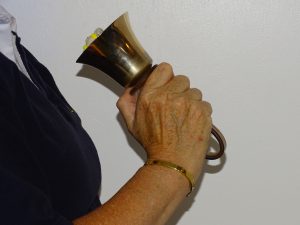Are there any handbells in your tower? Don’t be afraid to use them to learn all about hunting and the importance of knowing your place.
It doesn’t matter if you have never picked up a handbell before! Holding the strap with your thumb uppermost, practise the upstroke (equivalent to a handstroke in the tower) and a downstroke (equivalent to the backstroke). It takes a little bit of time to get used to the wrist and hand movement required, but it’s easy to practise!

To plain hunt on 4, ask the most experienced ringers to take the 2, 3 and 4, while you have the treble. If there are no experienced ringers, well, this need not hinder you and you will probably have a lot of fun getting started! Try some rounds on 4 first. Then take things slowly; try half a course of Plain Hunt on 4. From the treble you will sound first, then second, third and finally fourth, on successive strokes. Ring really slowly so that you have time to count your place. If possible, count out loud. Stop when you get to 4 th place. Have a cup of tea and think about how you are going to hunt back down to the front. You will have to start in in reverse rounds and remember, hunting down is a bit harder than hunting up! Why is this?
The answer is because there is one fewer bell striking between each of your blows.
1 2 3 4
2 1 4 3
Look at the path of the 4 in these two rows. Only two bells strike before it has to ring again.
Just like before, the counting out loud helps. Then you can put the two exercises together which gives you Plain Hunt on 4 for a whole course.
You can extend this by doing the same again but on six bells. With a bit of practice, you will have mastered something which takes a lot longer to achieve on tower bells and you will also have gained an understanding of how to count your place and to know which place your bell is in a
change. Well done!
If you are interested in pursuing handbell ringing, you can now follow the new Learning the Ropes programme for handbells as well as tower bells.

Handbell in the ‘up’ position
Learning the Ropes Handbells (LtRH) is a progressive learning scheme for change ringing on handbells, based on the principles of music grades or karate belts. Just like the LtR we are all familiar with, it has five stages, known as levels. Each level develops key skills. When you have
completed LtRH Level 5, your handbell ringing will be at a standard where you will be able to progress quickly forwards in the exciting and challenging world of handbell ringing.

Handbell in the ‘down’ position
To find out more, visit the Learning the Ropes website, and you can also buy a copy of the Personal Progress Logbook for Handbells in the SmART Ringer Shop – maybe one for you and some for your friends?
This learning tip originally appeared in the April Edition of Tower Talk – a free, downloadable magazine written by ringers for ringers. If you would like to read the rest of the magazine, please download one here, or subscribe for future copies by email.

